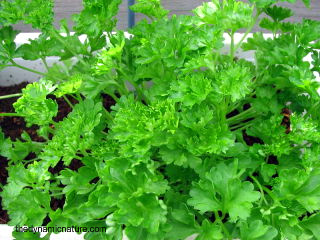Vitamin K for coagulation of blood
Vitamin A Vitamin B complex Vitamin C Vitamin D Vitamin E Vitamin K
Coagulation is a complex biological process by which blood clots.
'Koagulation' is a German word meaning coagulation. Hence the fat soluble, essential organic
micronutrient responsible for blood clotting is named Vitamin K ('K' from 'Koagulation').
Vitamin K is categorised into three forms, depending upon their origin and structure.
Vitamin K1 (phylloquinone) is synthesised by the plants.
Vitamin K2 (menaquinone) has sub forms and it is produced by the gut bacteria.
The synthetic form is Vitamin K3
(menadione).
Vitamin K1 helps in blood clot regulation, reduces inflammations and bone loss.
Vitamin K2, by activating osteocalcin, moves calcium into skeletal tissues
and protect it from osteoporosis.
Vitamin K3, as it can cause serious side effects, is not allowed for use in supplements
and it is only used in the treatment of cancer.

parsley
Deficiency
Deficiency of vitamin K rarely occurs, as it is produced by gut bacteria
and also can be sourced from food of plant origin.
Prolonged use of antibiotics, by destroying the gut bacteria may cause deficiency of this vitamin.
Persons with impaired intestinal absorption may also suffer from the deficiency of vitamin K.
Persons who are on anticoagulants may also experience deficiency.
Risk of vitamin K deficiency is high in new born infants as their gut bacteria would not have established.
Infants may suffer from
bleeding inside their
skull, if they are deficient in vitamin K.
This situation may be life threatening.
Pregnant women and women who are nursing newborns must particularly consume good plant sources of vitamin K.
In deficiency blood clotting mechanism is impaired resulting in prolonged bleeding.
Initial symptoms are, bleeding gums, nasal bleeding, blood traces in urine and stools and
heavy and prolonged menstruation.
In severe deficiency the patient may bleed to death.
Toxicity
Toxicity is not encountered for vitamin K1 and vitamin K2.
There can be some allergic reactions.
As for vitamin K3 severe side effects may be experienced and hence its use is restricted.
Sources
Leafy vegetables, fruits and whole grains are good sources of vitamin K.
Google+ page
By Mahmood Syed Faheem
Advertisement
Disclaimer: Not professional advice - The above content is just for informational & educational purpose only If you need specific medical advice please seek a professional doctor who is licensed or knowledgeable in that area.